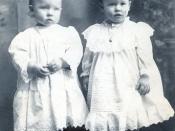C.S. Lewis perceives sees the nature of God as "a dynamic, pulsating activity, a life, almost a kind of drama. Almost, if you wont think me irreverent, a kind of dance." It is precisely this fellowship of love that we talk of when we dare to talk of God. He reasons that there must be a "perfect goodness" behind the universe that is interested in what we do. And if that perfect goodness exists, it must disapprove of much of our behavior. "I think we have to assume," he says, "it is more like a mind than it is like anything else we know." Perhaps that is because it has rules. To Lewis, that perfect goodness, that Being, is what we call God.
The concept of reality hits home in Lewis' book "A Grief Observed" where Lewis narrates through his journal the pain and agony he goes through after loosing his wife, Joy.
"Reality, looked at steadily, is unbearable. And how or why did such a reality blossom (or fester) here and there into the terrible phenomenon called consciousness? Why did it produce things like us who can see it and, seeing it, recoil in loathing? Who (stranger still) want to see it and take pains to find it out, even when no need compels them and even though the sight of it makes an incurable ulcer in their hearts? People like H. herself, who would have truth at any price," (Grief Observed, p. 28) Reality, for Lewis at this time was truth, unmistakable, unchangeable truth, and that truth involved suffering and pain.
"Charity means 'Love, in the Christian sense'. But Love, in the Christian sense, does not mean an emotion. It is a state not of the feelings but of the will; that state of the will...


![[Portrait of Dizzy Gillespie, John Lewis, Cecil Payne, Miles Davis, and Ray Brown, Downbeat, New York, N.Y., between 1946 and 1948] (LOC)](https://s.writework.com/uploads/7/70016/portrait-dizzy-gillespie-john-lewis-cecil-payne-miles-davis-thumb.jpg)